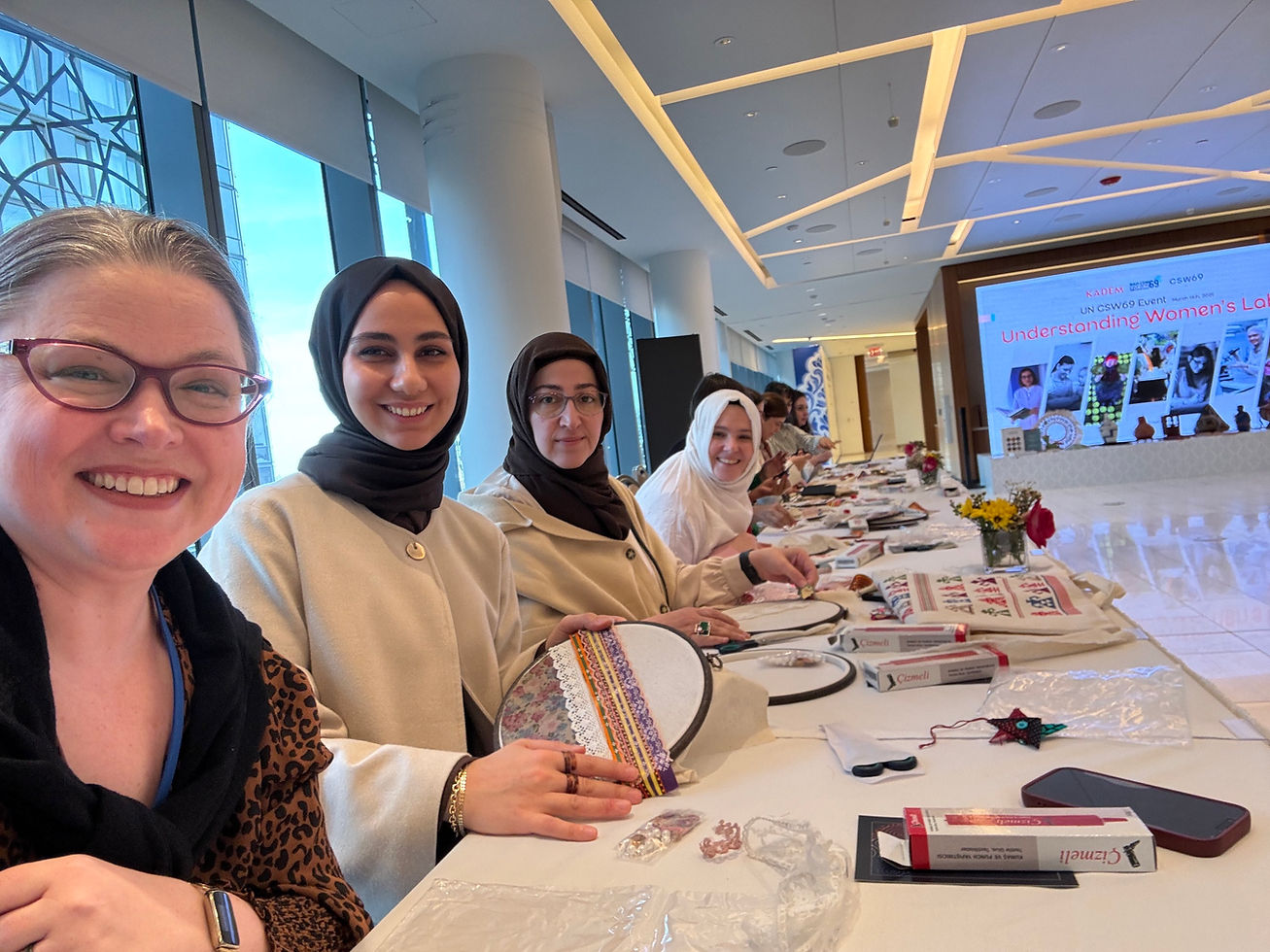
DAY 5 at CSW69: Understanding Women’s Labor
- Sarah E. Flynn

- Mar 15, 2025
- 4 min read
Updated: Mar 19, 2025
By the time Friday arrived, the energy of CSW69 had reached its peak. After a week of panels, workshops, and conversations that challenged our perspectives on gender equality and global collaboration, the final day brought an incredible mix of ideas, creativity, and connection. Though exhaustion lingered after days of thought-provoking discussions, Day 5 reminded me why we do this work—to amplify voices, build bridges across cultures, and create actionable change for women everywhere.
Understanding Women’s Labor: A Global Perspective

The session hosted by KADEM at the Turkish House was a powerful exploration of women’s labor—its visible and invisible dimensions, its role in sustainability, and its potential to drive social justice. From caregiving and domestic work to grassroots initiatives and climate resilience, the conversations illuminated how women’s contributions are often undervalued despite being critical to societal and economic structures. Panelists from Türkiye, Argentina, Qatar, the United States, and beyond shared their insights on empowering women through policy changes, cultural diplomacy, and innovative grassroots projects.
This session didn’t just examine the challenges women face—it celebrated their resilience and creativity. It was a call to action for governments, civil society, and individuals to recognize the full scope of women’s labor and ensure it is valued in both public and private spheres.
PANELIST HIGHLIGHTS
Assoc. Prof. Saliha Okur Gümrükçüoğlu
Chair of the Executive Board, KADEM, Türkiye

The establishment of nearly 50 women's cooperatives in Türkiye demonstrates the potential for grassroots initiatives to drive economic empowerment and social change.
Recognizing the value of women's labor beyond traditional economic metrics is crucial for developing inclusive policies that support gender equality.
Flexible work arrangements are essential for helping women balance professional and family responsibilities, thereby enhancing their overall well-being.
H.E. Mahinur Özdemir Göktaş
Minister of Family and Social Services, Republic of Türkiye

Inclusive policies that support women's workforce participation are vital for fostering a more equitable society where women's contributions are valued and recognized.
Initiatives like "Turn Your Hobby into Your Job" can empower women by transforming their skills into sustainable economic opportunities.
Turkey's development plans to increase female labor force participation highlight the importance of government-led initiatives in promoting gender equality.
Dr. Nursem Keskin Aksay
Executive Board Member, KADEM, Türkiye

Ethnographic research on women's labor in Turkey reveals the complex interplay between cultural, social, and economic factors that shape women's experiences.
A deeper understanding of women's labor beyond economic participation is necessary for creating policies that truly support their empowerment.
The emotional and social dimensions of women's labor are often overlooked but are crucial for understanding their overall contributions to society.
Fabiana Menna
President, Fundacion Gran Chaco (W20), Argentina

Grassroots organizations in Argentina have shown that empowering women through self-employment and digital skills can lead to significant economic gains and social change.
Understanding local contexts and cultural nuances is vital for developing effective strategies to empower women economically.
The sale of handicrafts in international markets demonstrates how traditional skills can be leveraged for modern economic opportunities.
Zeliha Sağlam
Chair of the Executive Board, African Crafts and Culture House, Türkiye

African crafts not only preserve cultural heritage but also serve as a vital means of economic empowerment for women, allowing them to maintain independence and contribute to their communities.
The African Culture House's efforts to create a fair market for handmade products highlight the potential of cultural diplomacy in promoting women's economic independence.
Supporting women's craft labor can help preserve cultural traditions while fostering economic growth.
Dr. Sharifa Noaman Al Emadi
Executive Director, Doha International Family Institute, Qatar

Family-friendly policies, such as maternity leave and flexible work arrangements, are crucial for increasing women's participation in the workforce and enhancing family cohesion.
Education plays a pivotal role in challenging stereotypes and increasing women's labor force participation in regions like the GCC.
Addressing unpaid domestic work is essential for promoting gender equality and supporting women's career advancement.
Florence Ackey
Founder and Executive Director, Refugee and Migrant Women’s Initiative (RAMWI), USA

Refugee and migrant women make significant economic and social contributions, often despite facing substantial barriers to formal employment and social integration.
Inclusive policies and mentorship programs are essential for supporting these women and recognizing their resilience and adaptability.
Valuing the intrinsic and external economic contributions of refugee women can help ensure their full participation in host economies.
Tess Mateo
Advisory Board Member, Bluerloop (W20), Global

Global collaboration and technology can be powerful tools for addressing the systemic barriers that hinder women's labor equity and economic empowerment.
Digital transformation offers new opportunities for women to engage in entrepreneurship and access global markets, thereby enhancing their economic independence.
International cooperation is essential for developing policies that recognize and support women's diverse forms of labor.
Crafting with Friends
Sitting casually amidst women from all corners of the globe—leaders, activists, scholars, and creators—was a bit surreal. As we shared stories, laughed together, and created tangible pieces of art during the workshop that followed the panel discussion, I couldn’t help but feel a deep sense of hope. These moments reminded me that change begins with connection. When we listen to one another’s experiences and collaborate across boundaries, we build a foundation for a more equitable world.

My Questions:
How can I begin valuing the invisible labor in my own life? How do my husband and I value labor differently/similarly? My children?
And with that, sweet dreams — I’ll be back tomorrow!
















Comments